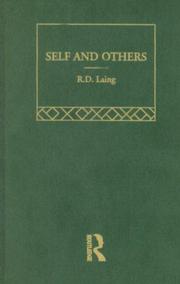| Listing 1 - 10 of 703 | << page >> |
Sort by
|

ISBN: 0863775969 0863775950 9780863775963 Year: 2004 Publisher: New York Psychology Press
Abstract | Keywords | Export | Availability | Bookmark
 Loading...
Loading...Choose an application
- Reference Manager
- EndNote
- RefWorks (Direct export to RefWorks)

ISBN: 0809383322 1299050875 0585098301 9780585098302 9780809322596 0809322595 0809322595 9780809383320 9780809383320 9781299050877 Year: 1999 Publisher: Carbondale : Crab Orchard Review : Southern Illinois University Press,
Abstract | Keywords | Export | Availability | Bookmark
 Loading...
Loading...Choose an application
- Reference Manager
- EndNote
- RefWorks (Direct export to RefWorks)
The Star-Spangled Banner, Denise Duhamel's sixth book of poems, is about falling in love, American-style, with someone who is not American. In the title poem, a small American girl mishears the first line of ""The Star-Spangled Banner"" as ""José, can you see?"", which leads her to imagine a foreign lover of an American woman dressed in a star-spangled gown. The misunderstandings caused by language recur throughout the book: contemplating what ""yes"" means in different cultures; watching Nickelodeon's ""Nick at Nite"" with a husband who grew up in the
Book
ISBN: 0814336337 9780814336335 9780814335109 0814335101 Year: 2011 Publisher: Detroit Wayne State University Press
Abstract | Keywords | Export | Availability | Bookmark
 Loading...
Loading...Choose an application
- Reference Manager
- EndNote
- RefWorks (Direct export to RefWorks)
Book
ISBN: 1400846382 9781400846382 1299557945 9781299557949 9780691154732 0691154732 Year: 2013 Publisher: Princeton, NJ
Abstract | Keywords | Export | Availability | Bookmark
 Loading...
Loading...Choose an application
- Reference Manager
- EndNote
- RefWorks (Direct export to RefWorks)
We are partial to people with whom we share special relationships--if someone is your child, parent, or friend, you wouldn't treat them as you would a stranger. But is partiality justified, and if so, why? Partiality presents a theory of the reasons supporting special treatment within special relationships and explores the vexing problem of how we might reconcile the moral value of these relationships with competing claims of impartial morality. Simon Keller explains that in order to understand why we give special treatment to our family and friends, we need to understand how people come to matter in their own rights. Keller first presents two main accounts of partiality: the projects view, on which reasons of partiality arise from the place that people take within our lives and our commitments, and the relationships view, on which relationships themselves contain fundamental value or reason-giving force. Keller then argues that neither view is satisfactory because neither captures the experience of acting well within special relationships. Instead, Keller defends the individuals view, on which reasons of partiality arise from the value of the individuals with whom our relationships are shared. He defends this view by saying that we must accept that two people, whether friend or stranger, can have the same value, even as their value makes different demands upon people with whom they share different relationships. Keller explores the implications of this claim within a wider understanding of morality and our relationships with groups, institutions, and countries.
Interpersonal relations --- Human relations --- Interpersonal relationships --- Personal relations --- Relations, Interpersonal --- Relationships, Interpersonal --- Social behavior --- Social psychology --- Object relations (Psychoanalysis) --- Philosophy.

ISBN: 1134640897 1280324392 9786610324392 0203210328 0203258762 9780203258767 9780203210321 9780415198196 0415198194 9781134640898 9781134640843 9781134640881 1134640889 Year: 1999 Publisher: London ; New York : Routledge,
Abstract | Keywords | Export | Availability | Bookmark
 Loading...
Loading...Choose an application
- Reference Manager
- EndNote
- RefWorks (Direct export to RefWorks)
Published in the year 2002, Selected Works RD Laing: Self & Other V2 is a valuable contribution to the field of Major Works.
Psychiatry --- Interpersonal relations. --- Human relations --- Interpersonal relationships --- Personal relations --- Relations, Interpersonal --- Relationships, Interpersonal --- Social behavior --- Social psychology --- Object relations (Psychoanalysis)

ISBN: 0804780374 0585457808 9780585457802 0804744165 0804744173 Year: 2002 Publisher: Stanford, Calif. : Stanford University Press,
Abstract | Keywords | Export | Availability | Bookmark
 Loading...
Loading...Choose an application
- Reference Manager
- EndNote
- RefWorks (Direct export to RefWorks)
What are the processes and mechanisms involved in interpersonal behavior, and how are these constrained by human biology, social structure, and culture? Drawing on and updating classic sociological theory, and with special reference to the most recent research in evolutionary and neurophysiological theory, this ambitious work aims to present no less than a unified, general theory of what happens when people interact. Despite modern technologies that mediate communication among individuals, face-to-face interaction is still primal and primary. This book argues against recent social theory that postulates a dramatic change in the nature of human relationships under postmodernity and, instead, asserts that despite undeniable and accelerating change in people’s environments, certain basic human tendencies toward emotionally inflected, physically present social interaction remain strong. Turner builds on first principles he locates in the work of Mead, Freud, Schutz, Durkheim, and Goffman. After brief overviews of previous work on the embeddedness of social interaction in sociocultural systems and in human biology, each chapter presents elements of the microdynamics involved in encounters: emotions, motivations (transactional needs), culture (normative conventions), role processes, status, demographics, and ecology. Each chapter ends with a series of testable propositions, which are then streamlined into a series of summary principles intended to motivate future research. The book concludes with some cautious hypotheses on the potential influence of microprocesses on broader social dynamics.
Book
ISBN: 0889848475 9780889848474 9780889844063 0889844062 Year: 2017 Publisher: Erin, Ontario
Abstract | Keywords | Export | Availability | Bookmark
 Loading...
Loading...Choose an application
- Reference Manager
- EndNote
- RefWorks (Direct export to RefWorks)
"This is the work of a deeply engaged poet whose exploratory syntax and probing imagery come together to form intense meditations on the nature of community and the transfigurative power of the imagination. Reibetanz's poetry suggests that family, community and identity are all willed constructions, something we build collectively out of the resources available. This is the sixteenth volume in the Porcupine's Quill Essential Poets Series."--
Book
ISBN: 1629220825 1629220817 9781629220819 9781629220826 9781629220802 1629220809 Year: 2018 Publisher: Akron, Ohio
Abstract | Keywords | Export | Availability | Bookmark
 Loading...
Loading...Choose an application
- Reference Manager
- EndNote
- RefWorks (Direct export to RefWorks)
Book
ISBN: 1641130725 9781641130721 9781641130707 1641130709 9781641130714 Year: 2018 Publisher: Charlotte, NC
Abstract | Keywords | Export | Availability | Bookmark
 Loading...
Loading...Choose an application
- Reference Manager
- EndNote
- RefWorks (Direct export to RefWorks)
Book
ISBN: 9783030944926 Year: 2022 Publisher: Cham Springer International Publishing :Imprint: Palgrave Macmillan
Abstract | Keywords | Export | Availability | Bookmark
 Loading...
Loading...Choose an application
- Reference Manager
- EndNote
- RefWorks (Direct export to RefWorks)
| Listing 1 - 10 of 703 | << page >> |
Sort by
|

 Search
Search Feedback
Feedback About UniCat
About UniCat  Help
Help News
News